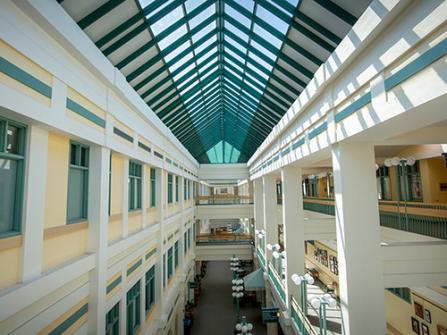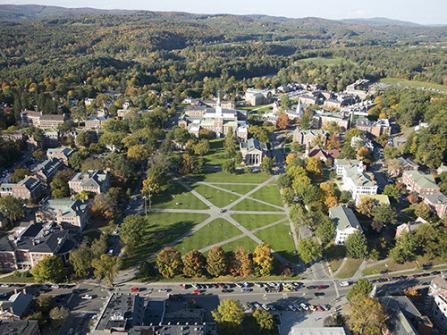Welcome to Dartmouth Hitchcock Medical Center
We have everything that you would expect a major academic center to have, from inpatient wards, outpatient clinics, to a cardiac Cath lab. Dartmouth Hitchcock Medical Center is a beautiful institution and provides a welcoming collegial atmosphere.
Program information
Mission statement
Our mission is to guide and educate our fellows as they develop the skills and expertise to provide safe, high value patient care through professional, ethical and compassionate behavior. We empower our fellows to address healthcare disparities, and to continuously improve their education, practice, and the community health care system as a whole.
Program aims
We strive to graduate fellows who are well trained in all major facets of cytopathology (gynecologic, non-gynecologic, and fine needle aspiration [FNA]), and who are committed to providing excellent medical care to the patients and communities that they will serve.
Program overview
The cytopathology fellowship is based at Dartmouth Hitchcock Medical Center, New Hampshire’s only academic medical center. The center is affiliated with the Audrey and Theodore Geisel School of Medicine at Dartmouth. Fellows see the broad range of basic and complex cases encountered at a tertiary care academic institution. They benefit from collaboration with five board-certified cytopathologists, who themselves trained under nationally and internationally recognized leaders in cytopathology. The faculty subspecialty interests, in addition to cytology, include informatics, breast pathology, bone and soft tissue pathology, gastrointestinal pathology, and medical sociology. The faculty includes the 2018 Cancer Cytopathology Young Investigator awardee, Dr. Louis Vaickus. In addition to “signing out” cytology cases, Dr. Vaickus conducts an active, funded research program in informatics - including deep learning - related to cytology. Fellows have the opportunity to participate in this research.
During the fellowship year, fellows rotate through the Laboratory for Clinical Genomics and Advanced Technology (CGAT), a state-of-the-art, comprehensive molecular diagnostics facility directed by Gregory Tsongalis, PhD, the author of numerous textbooks in the field. The laboratory is nationally recognized for its work on the development of novel diagnostic technologies and the rapid implementation of molecular tests for clinical use. Recent cytopathology fellows rotating through this laboratory have published academic papers resulting from the rotations.
Current members of the cytopathology faculty serve on the editorial boards of major pathology journals and regularly contribute publications to major national and international cytopathology journals. Fellows are allotted time for research with the expectation that projects, conducted in collaboration with the cytopathology faculty, will lead to publications in peer-reviewed academic journals.
The learning environment is supplemented by proximity to Dartmouth College. The region offers a full range of college spectator sports, concerts, and theater, as well as ample opportunities for outdoor activities such as hiking, biking, and winter sports.
Faculty
Rotation schedule
Cytopathology Rotations - 1 Block = 4 Weeks
Cytology – 10.75 blocks
The aim of this one-year clinical program is to provide the fellow with the knowledge and skills to become a competent cytopathologist. The fellow will gain extensive experience in the preparation and interpretation of gynecological and non-gynecological cytology samples. Fellows will learn to appreciate the importance of cyto-histological correlation. They will assume graduated responsibility for cases.
Fine Needle Aspiration (FNA) – 10.75 blocks
The fellow will gain experience with fine needle aspiration biopsy cases including cases for which rapid on-site evaluation (ROSE) is provided as well as “non-ROSE” FNAs. As the need arises, he/she will perform FNAs on superficial masses.
Molecular Pathology – 0.5 block
The Molecular Pathology rotation provides fellows with exposure to the basic techniques associated with nucleic acid-based diagnostic testing. Fellows will become familiar with both manual and automated technologies including but not limited to: DNA isolation, restriction enzyme analysis, electrophoresis, Southern blotting, polymerase chain reaction, DNA sequencing, bDNA and hybrid capture. Fellows will gain exposure to clinical testing for infectious diseases, genetic diseases, clonality studies, identification of “tumor markers,” and identity testing (including “DNA fingerprinting” for identification of patients and specimens in cases of potential specimen mix-ups). Additional time is also available to rotate through this laboratory to gain more extensive hands-on experience and to engage in a research project.
Research – 0.75 block
The fellow will have three weeks of research time scheduled in one week blocks. By mid-fall, the fellow is expected to have begun a research project. It is anticipated that the research will lead to both an abstract submission for presentation at a national meeting, as well as, a manuscript submission for publication. The project is done under the mentorship of the Cytopathology faculty.
Working at Dartmouth Hitchcock Medical Center
We offer benefits, including stipends, insurance, and assistance programs.
See also important/required GME policies to read prior to your interview:
Conferences
The cytopathology fellow is expected to participate in conferences at least once a month and must give a minimum of two presentations per year, including formal presentations at tumor board, journal clubs or educational conferences. Teaching conferences include preparation of cytology specimens, and regulatory agency requirements, etc; a cytology-histological correlation conference given by the fellows and residents; invited presentations, including talks on statistics and patient safety; a monthly slide review conference; a monthly unknown conference, and slide conferences for the cytotechnologists.
| Conference | Frequency |
|---|---|
| Sub-Specialty Glass Slide Conference | Weekly |
| Cytology Over-the-Scope Review/Cytology Didactics | Bi-Weekly |
| AP Didactic Conference | Weekly |
| American Society of Cytology | Monthly |
| Pathology Journal Club | Monthly |
| Pathology Grand Rounds | Monthly |
| Laboratory Management Seminar | One-day Seminar |
| Hematopathology Conference | Weekly |
Leadership Preventive Medicine Residency (LPMR)
- Builds on TDI strengths in outcomes research, improvement, population health and institutional commitment to quality, safety, and value
- MPH degree from TDI – tuition paid by the program!
- Opportunity to lead change and improvement at Dartmouth Hitchcock Medical Center
- Two-month governmental public health experience
- Dedicated faculty coach; teaching opportunities; unique multi-specialty resident/fellow/faculty group
- May incorporate research in one year of the program (3 + 1)
- Continue clinical work
- Moonlighting allowed
- Graduates are in demand and employers are very interested in their mix of clinical skills plus improvement and change knowledge and experience
- Visit the LPMR web page, email tina.c.foster@hitchcock.org or contact an alum to learn more!
Contact us
elaine.r.danyew@hitchcock.org (Program Coordinator)
edward.j.gutmann@hitchcock.org (Program Director)
Life in the Upper Valley
The Upper Connecticut River Valley area of central New Hampshire and Vermont includes the towns of Hanover and Lebanon, New Hampshire. Known as "The Upper Valley," this region attracts people from around the world for its scenic beauty.
The Upper Valley area offers a wide variety of cultural and recreational activities for people of all ages.

